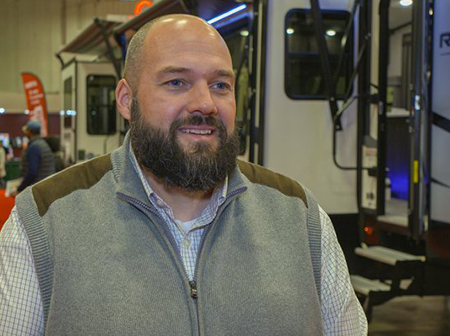RVing during retirement: 6 tips and considerations
Retirement is an exciting milestone—and for many it means lots of extra free time to pursue new hobbies. It’s no surprise that travel is often high on this list. Maybe you’re interested in new exploration and journeys—taking your time to explore the road less traveled, without the timelines, obligations and pre-determined itineraries that held you back pre-retirement. That’s why the RV lifestyle can be incredibly appealing to retirees—for the freedom and adventure it allows.
So, should you dive into the RV lifestyle when you retire? Here are 6 tips and considerations.
1. Think about your retirement objectives.
You may be thinking, “Objectives?? I retired so I could get out of the rat race!” We get it. But hear us out: As a retiree there are certainly things you hope to do and enjoy in this next phase of life. For RV owners Jim and Margaret, retirement meant addressing the “4 M’s”: Money, Muscle, Memory and Meaning. The RV lifestyle fulfilled all four: conserving money and getting the most from a fixed income; staying in shape and active (muscle); creating invaluable memories; and adding meaning to the day after career life comes to a close. What are your retirement objectives? Do they align with the RV lifestyle?

2. Consider the RV that works with your retirement lifestyle.
Jeremy Puglisi (cohost of RV Travel Atlas podcast and co-author of Idiot’s Guides: RV Vacations) told AARP that the first step is to ask yourself if you want to drive or tow your RV. Fortunately, there is an extremely wide range of RVs for every lifestyle and need.
3. Size matters.
Jeremy also emphasizes the importance of thinking about RV size: “A second big thing you really need to think through is how big of an RV do you want,” he says. “A lot of people … could be tempted to buy a really big 40-foot RV because you want the space. But you need to consider that you might have a harder time getting into some campsites.” If you’re completely new to RVing, consider a smaller to mid-sized unit to get your feet wet. You can always trade-in and trade-up once you’re comfortable!
4. Go your own way.
While purchasing an RV can be a big decision, it doesn’t have to feel black or white. The Retirement Manifesto blog points out that the great thing about RVing is that there’s no right or wrong answer regarding how to RV in retirement. “There are as many answers to that question as there are personal preferences,” they say. “The beauty of RVing is the ability to adapt it to whatever approach works for you.” We couldn’t agree more. In fact, if you’re still on the fence about whether the RV lifestyle is right for you, there are low-investment ways to test it out—whether that means trying out a more entry-level unit or even renting an RV for a test run. Whether it’s RVing every other weekend or just a couple trips a year, feel free to choose your path!
5. You don’t have to love camping.
.jpg)
If you’ve ruled out RVing because you’re not a camper, think again. Family members (including his wife) thought retiree Al Boldt was crazy when he brought up RVing in retirement. “About five years before he actually retired, he said something about [becoming RVers] to me,” his wife Greta says. “I looked at him and said, ‘You’re crazy. We don’t even camp!’ He just said, ‘Keep it in the back of your head and mull it over.’” As it turns out, most retired RVers fall into the lifestyle as a better, more cost-effective and richer alternative to exploring the continent via air travel. In other words, it’s not always about getting off the grid and back in touch with nature. Retirees are using their RV to visit grandchildren, see cities they haven’t yet visited and check major landmarks off the bucket list (Mount Rushmore anyone?).
6. Get ready to make new friends.
Beyond the memories you’ll make for yourself and your family, perhaps one of the most exciting things about RVing in retirement is the new friends you’ll make. “It is a very social lifestyle,” says Roger Buchanan, vice president for regional operations at Carefree Communities, “When someone first comes to an RV park, they are coming into the site, people next to them are giving directions, ‘pull forward,’ and help them get set up. They ask where they are from, ask them to come to the campfire, and then maybe have a drink or dinner.” So, if you’re looking to expand your social circle in retirement—or just enjoy the excitement of new faces—RVing may be the easiest way to do it!
Wondering which RV might be best for you in retirement? Check out our coach line-up.



